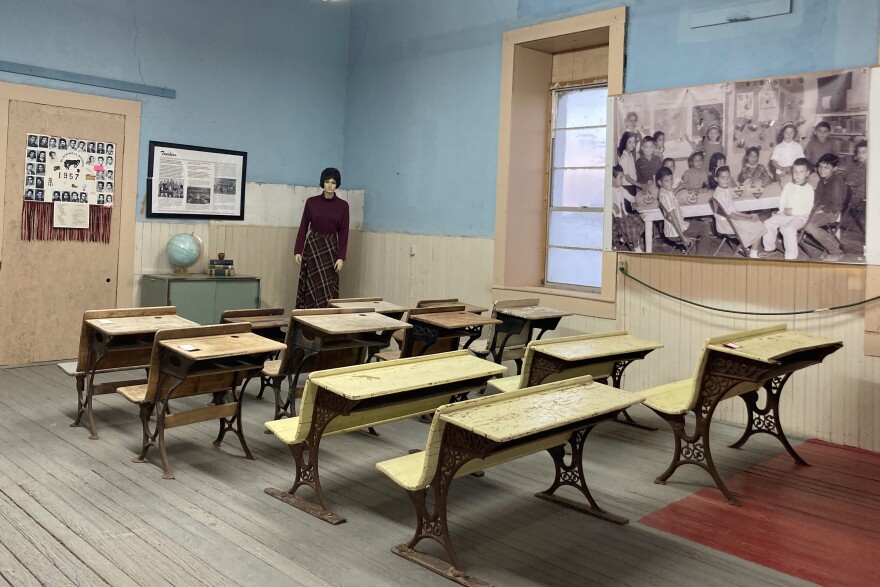Students were not allowed to speak Spanish at school.
That was the rule that teachers instituted at a small West Texas schoolhouse near the United States-Mexico border in the 1950s, even though Spanish was the native language for many of the Mexican-American children there.
The Blackwell School in tiny Marfa, Texas, was just one of many segregated schools across the southwest where Hispanic children were taught separately from their white peers.
Now, the old adobe building is set to become a national historic site that supporters say will explore the often untold story of how school segregation played out in this corner of the U.S. The moment is the culmination of years of work by Blackwell alumni to preserve the school's history and to obtain formal recognitions for the site.
The school sits on a dusty lot in a quiet, residential part of Marfa. Built in 1909, the building is all that remains of what used to be a more sprawling campus.
Segregation of Hispanic students in Texas and the southwest often happened without laws requiring it
Mario Rivera, who grew up in Marfa, recently gazed around the building's two small rooms and remembered when he was an elementary student there, a time when this town of just a few thousand people was still heavily segregated.
"I hadn't really mixed with whites, because I come from the barrio," he says. "Out there, it's just my brothers and sisters, all Hispanics."
Marfa's Hispanic children attended the Blackwell School for decades, until 1965, when local schools finally integrated.
"Nobody told me that we were being segregated," Rivera says. "It's like I've said a bunch of times, I didn't even know what the word meant."
Unlike the historic segregation of white and Black students in the U.S., segregation of Hispanic students in Texas and across the southwest often happened without laws on the books requiring it.

The racism of this system was evident even in Blackwell's classroom rules: White teachers often banned Hispanic students from speaking Spanish. Jonna Perrillo, professor at the University of Texas at El Paso, told Marfa Public Radio that some students were even beaten for it.
"Or put in closets, or given demerits for speaking Spanish, even on the playground," she said. "And this was policy."
Jessi Silva, another former Blackwell student, remembers when teachers forced her and her classmates to write pledges on slips of paper vowing not to speak Spanish. The students were then made to bury the pledges in a small box.
A hope that it's a step toward including more stories of Hispanic people in West Texas history
"We had gone to family funerals before, so we understood that there was a funeral going on, but we didn't know why," Silva recalled in a 2017 StoryCorps conversation. "Everybody was really quiet when they buried Mr. Spanish."

Despite these painful memories, some former Blackwell students also look back fondly on their time there. That's because, they say, they received a good education, one they might have not had access to without the school.
Gretel Enck, president of the alumni-founded group Blackwell School Alliance, says those mixed memories are an important part of this history.
"It's a mosaic of everybody's experience who came here, and we shouldn't be afraid of that complexity," she says.
Rivera, one of the former students, hopes the new historic site that Congress recently approved will also be a step toward including more stories of Hispanic people in West Texas history, which is often dominated by tales of anglo ranchers.
"Because this used to belong to Mexico," he says. "What happened to all of those Mexicanos that came here and settled here? A lot of history is lost, forgotten or just swept under the rug."
The existing museum at the old Blackwell schoolhouse will eventually be expanded. According to Enck, the historic site designation is already drawing new visitors.
Copyright 2022 Marfa Public Radio


